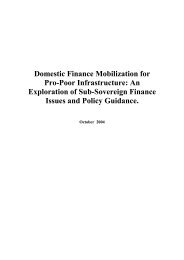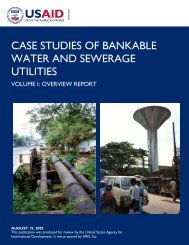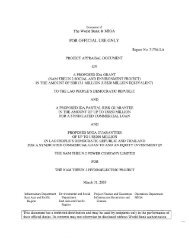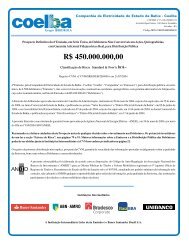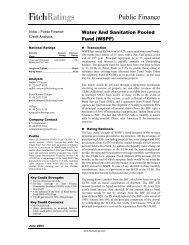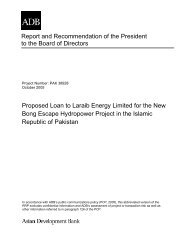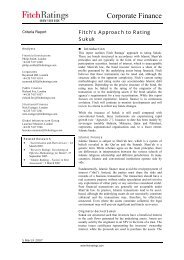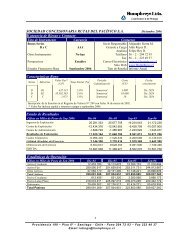EAP - The Pacific Infrastructure Challenge - World Bank (2006).pdf
EAP - The Pacific Infrastructure Challenge - World Bank (2006).pdf
EAP - The Pacific Infrastructure Challenge - World Bank (2006).pdf
Create successful ePaper yourself
Turn your PDF publications into a flip-book with our unique Google optimized e-Paper software.
<strong>The</strong>re are three classic types of private participation contract:<br />
Concession Contract: This contract is most closely related to<br />
privatization. Under this contract, the concessionaire is responsible for all<br />
aspects of service provision and its shareholder(s) or parent company is<br />
rewarded with profit from the utility, after all operating and debt service<br />
costs are paid. Vanuatu has a concession in place for water and electricity<br />
services, and Papua New Guinea has a concession in place for water<br />
services<br />
Lease Contract: In a lease contract, the government retains responsibility<br />
for planning and financing capital expenditure. <strong>The</strong> private operator is<br />
responsible for meeting agreed service standards that are achievable with<br />
the available assets. Tariff revenues are split in two: <strong>The</strong> first part covers<br />
operating and maintenance costs. This goes to the private operator. <strong>The</strong><br />
second part goes to the public sector to help finance additional investment<br />
Management Contract: Under a management contract, the private<br />
operator is typically paid a fixed fee for managing the utility, plus a<br />
performance fee for meeting financial and service improvement targets. It<br />
is the targets and payments in the management contract that determine<br />
how the operator directs the utility’s performance.<br />
While there are relatively few examples of private sector involvement in the <strong>Pacific</strong>,<br />
experience in some comparator countries has shown that this can help to improve<br />
infrastructure performance. Caribbean countries have significant private ownership<br />
or operation of electricity utilities or telecommunications companies, as well as<br />
private investment in roads, airports, ports and airlines. Private involvement has<br />
helped these countries to expand access, finance investment, boost efficiency, and<br />
limit government risk. However, poorly planned public-private partnerships have<br />
resulted in governments having to take back risks and costs they believed they had<br />
transferred.<br />
In the <strong>Pacific</strong>, Fiji has had success in outsourcing electricity generation, Vanuatu’s<br />
decision to engage a private operator to deliver water and electricity services under a<br />
concession contract has resulted in some of the most efficient services in the region.<br />
Ports in Samoa have benefited from adopting a ‘landlord’ model, in which port<br />
services are provided by private companies.<br />
<strong>The</strong>re are also examples where private sector involvement has been less successful.<br />
Some reports suggest that the concession arrangement for Papua New Guinea’s<br />
water utility in Port Moresby, ‘Eda Ranu’, has failed to deliver to expectations.<br />
Problems in the tender process, and a flawed contract which gave the operator<br />
responsibility for the supply, but not the distribution side of the water system, have<br />
been noted as some of the reasons for poor performance. Private sector involvement<br />
in the telecommunications sector has also failed to produce good performance,<br />
where long term exclusive licenses are awarded (see Box 7.7).<br />
52



